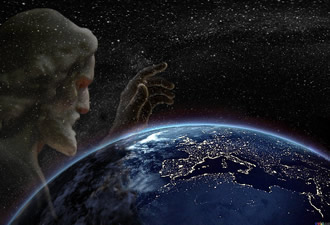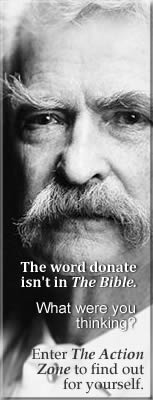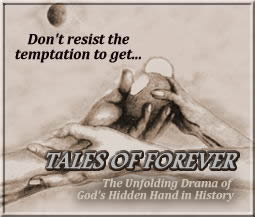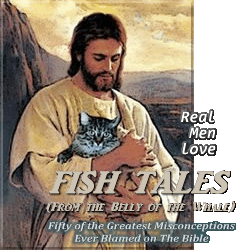Outsiders Looking In (Cont’d)
God the Outsider
Why do God’s various actions indicate that He’s both everywhere and nowhere at the exact same time? The most obvious answer we obtain from Genesis is that while Adam and Eve were created in the image of the Divine, and so were possessors of freedom and self-determination, the choice that the first couple made in eating from the Tree of Knowledge severed the relationship that then existed between the natural and supernatural realms. As such, the shift from how the primordial world existed before the Fall of Man and what it became after that cataclysmic event can never in a million years be overstated. Though God was still God—still omniscient, still omnipotent, still omnipresent—humankind from that point on no longer partook of the same relationship.
Stop and think for a moment, if you will, what it might have been like living before the Fall, still living in the fullness of God’s image, in a world still untainted by sadness or pain, slavery or suffering, darkness or death. Before the Fall, Adam and Eve were living in the same world as the Divine, but afterward, they were suddenly outsiders looking in, suddenly spiritual vagabonds dispossessed of freedom and self-determination. And so, just as Adam and Eve had become outsiders of God’s world after the Fall, God likewise had become an outsider to their world—and ours—ever since. Again, the implications of this ontological truth have such immense ramifications that the human mind can barely grasp them without a great deal of contemplation and struggle.
Before the Fall, God was bound by a covenant that endued Adam and Eve with the Divine presence which enveloped their very being. But after the Fall, God was equally bound by a covenant that revoked all that the Divine presence bestowed upon them. That meant not only would disease, pain, and death enter into this new world of theirs, all of God’s promises to them that they would rule and reign over the creation were revoked. Living in our modern age, in a world dominated by the scientific mastery of the elemental forces that surround us, this is something almost impossible for us to comprehend.
Story Continues Below
Says Richard Price—the founder and CEO of Academia.edu—on his podcast In Depth With Academia:
On Earth as It is On Heaven: The Promise of America, Technology, and the New Earth is:
To hear Price’s book review of On Earth as It is On Heaven, CLICK HERE.
To watch author and historian W. Kent Smith discuss the contents of his book On Earth as It is On Heaven, at the Sacred Word Revealed Conference ‘23, hosted by Zen Garcia, CLICK BELOW.
Story Continues From Above
What’s more, many believers of The Bible confuse the issue even further because they incorrectly insist humans are still lords and masters of creation by God’s decree, despite the alteration of that decree as a result of the Fall. What we see, then, is that anyone who claims humanity still maintains the condition they possessed before the Fall is twisting history to fit their pet view of Scripture. That’s because an honest appraisal of both the written record of The Bible and human history clearly demonstrates that after their expulsion from the Garden, Adam and Eve were no longer rulers over the elements of creation but slaves to them. No longer would they command the creation, the animals, and themselves; they were ever after prisoners of darkness and death, subject to the power and fear of the animals, and slaves and property of the devil to whom they submitted themselves when they defied God’s command.
Worse still, it also meant that because God’s covenant was voided by Adam and Eve’s disobedience, God, the Outsider, was no longer the legal Lord and Master of humanity. No longer was God free to bestow His blessings upon them, not because He despised the apple of His eye or ceased to love them with an everlasting love, but because He is by nature a God of covenant—a God bound by His own honor and integrity, bound by His word of promise. That’s why, from the moment the first couple was expelled from the Garden, they would be bound by a new covenant, and therefore their new legal lord and master was the devil himself, Satan.
Now keep in mind, when I say this, I’m not saying that this same God of covenant did not still have the power and desire to establish a new covenant for the sake of Adam and his descendants. Naturally, this is precisely what the story contained in Scripture was written to convey; the biblical record, then, is nothing less than the long and arduous road back to the presence of God, which road God alone provided the signposts in the various covenants that He’s instituted by the mouth of His prophets. What I am saying, though, by all the authority contained in The Bible itself, is that what people have claimed about the exalted status of the human race is negated by a correct understanding of the difference between what God said about our status in the Universe before the Fall of Man, and what it has been ever since the days of Adam.
Unless this foundational truth is fully appreciated, we will never be able to understand why God acts the way He does in terms of the ages-long history of human redemption as depicted in Scripture. Unless we first settle this primary fact of human existence, we’ll never come to appreciate that from the days of Adam to the time of the Great Flood, from the days of Noah until the time of the call of Abraham, and from the days of the Children of Israel until the days of the Advent of Christ, God has, by His own judicial decree, related to humanity as an outsider, outlier, and alien. This more than anything else explains why God sometimes acts in such God-like manner that no one dares question the divine nature of said actions, while at other times acts so inconspicuously that events can easily be dismissed as though no God at all was necessary for their occurrence.
It also explains why those chosen ones of God were, like Adam before them, the greatest outsiders of human history—men like Seth, Enoch, and Noah before the Flood, followed by the likes of Shem, Eber, and Abraham after it. The great constant running through the lives of the patriarchs was that all of them were never more alive than when they were embracing this peculiar sense of being “on the outside,” while everyone else was content with being “on the inside.” But, in following the call of God, every one of them blazed a singular trail that led the way for future generations to follow. Without the path uniquely cut by these lone wolves, there in turn could have been no Isaac or Israel or Judah; no Levi or Dan or Joseph; no Moses or Joshua or Caleb.
But long before men like Elijah found the courage to stand outside the status quo that led a chosen nation to turn its back on God, Who likewise stood on the outside in disbelief at the insanity of His own creation, Adam set the stage for all the outsiders who would follow in his footsteps.







